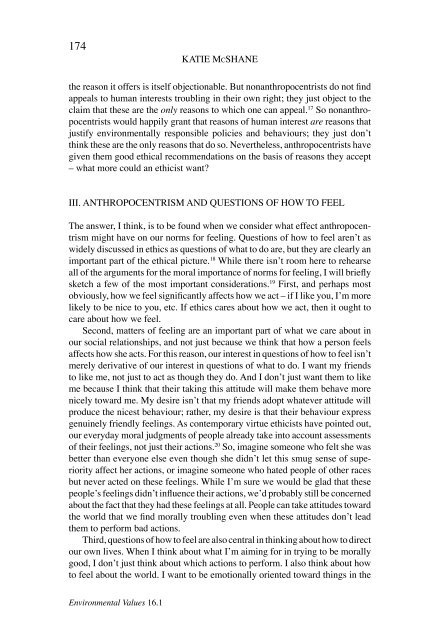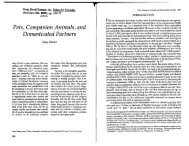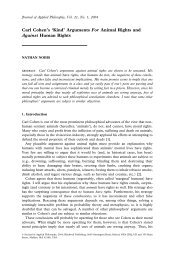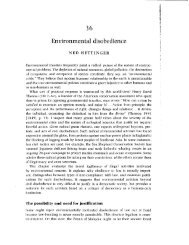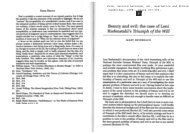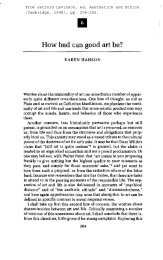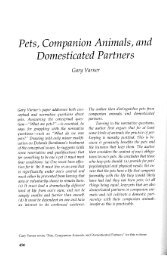Anthropocentrism vs. Nonanthropocentrism: Why Should We Care?
Anthropocentrism vs. Nonanthropocentrism: Why Should We Care?
Anthropocentrism vs. Nonanthropocentrism: Why Should We Care?
Create successful ePaper yourself
Turn your PDF publications into a flip-book with our unique Google optimized e-Paper software.
174<br />
KATIE MCSHANE<br />
the reason it offers is itself objectionable. But nonanthropocentrists do not find<br />
appeals to human interests troubling in their own right; they just object to the<br />
claim that these are the only reasons to which one can appeal. 17 So nonanthropocentrists<br />
would happily grant that reasons of human interest are reasons that<br />
justify environmentally responsible policies and behaviours; they just donʼt<br />
think these are the only reasons that do so. Nevertheless, anthropocentrists have<br />
given them good ethical recommendations on the basis of reasons they accept<br />
– what more could an ethicist want?<br />
III. ANTHROPOCENTRISM AND QUESTIONS OF HOW TO FEEL<br />
The answer, I think, is to be found when we consider what effect anthropocentrism<br />
might have on our norms for feeling. Questions of how to feel arenʼt as<br />
widely discussed in ethics as questions of what to do are, but they are clearly an<br />
important part of the ethical picture. 18 While there isnʼt room here to rehearse<br />
all of the arguments for the moral importance of norms for feeling, I will briefly<br />
sketch a few of the most important considerations. 19 First, and perhaps most<br />
obviously, how we feel significantly affects how we act – if I like you, Iʼm more<br />
likely to be nice to you, etc. If ethics cares about how we act, then it ought to<br />
care about how we feel.<br />
Second, matters of feeling are an important part of what we care about in<br />
our social relationships, and not just because we think that how a person feels<br />
affects how she acts. For this reason, our interest in questions of how to feel isnʼt<br />
merely derivative of our interest in questions of what to do. I want my friends<br />
to like me, not just to act as though they do. And I donʼt just want them to like<br />
me because I think that their taking this attitude will make them behave more<br />
nicely toward me. My desire isnʼt that my friends adopt whatever attitude will<br />
produce the nicest behaviour; rather, my desire is that their behaviour express<br />
genuinely friendly feelings. As contemporary virtue ethicists have pointed out,<br />
our everyday moral judgments of people already take into account assessments<br />
of their feelings, not just their actions. 20 So, imagine someone who felt she was<br />
better than everyone else even though she didnʼt let this smug sense of superiority<br />
affect her actions, or imagine someone who hated people of other races<br />
but never acted on these feelings. While Iʼm sure we would be glad that these<br />
peopleʼs feelings didnʼt influence their actions, weʼd probably still be concerned<br />
about the fact that they had these feelings at all. People can take attitudes toward<br />
the world that we find morally troubling even when these attitudes donʼt lead<br />
them to perform bad actions.<br />
Third, questions of how to feel are also central in thinking about how to direct<br />
our own lives. When I think about what Iʼm aiming for in trying to be morally<br />
good, I donʼt just think about which actions to perform. I also think about how<br />
to feel about the world. I want to be emotionally oriented toward things in the<br />
Environmental Values 16.1


